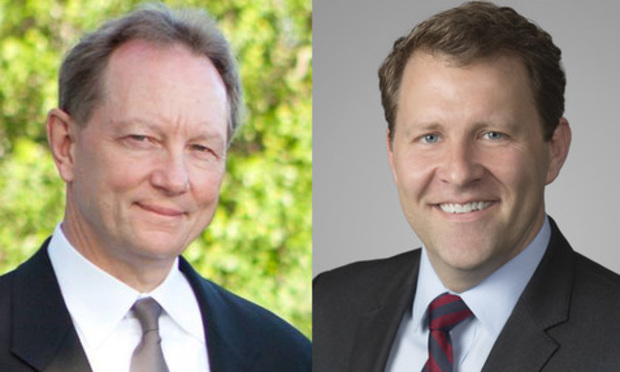Litigators of the Week: Kirkland Duo Win Big in a Case That 'Sends Chills Down Lawyers' Spines'
The fight between Teva and United Healthcare—which turned in large part on a he-said-she-said dispute with a client about authority to sign a settlement agreement—should scare every lawyer.
September 21, 2018 at 01:33 PM
12 minute read
The original version of this story was published on Litigation Daily
 Kevin Van Wart, left, and Brad Weidenhammer, right, with Kirkland & Ellis.
Kevin Van Wart, left, and Brad Weidenhammer, right, with Kirkland & Ellis.
The Litigator of the Week crown this week goes to Kirkland & Ellis partners Kevin Van Wart and Brad Weidenhammer for their win on behalf of Teva Pharmaceutical Industries in a suit against the nation's largest health insurance company, United Healthcare.
Teva sued United in 2016 in U.S. District Court for the Eastern District of Pennsylvania after United tried to walk away from a $125 million settlement agreement signed by United's outside lawyers. The resulting litigation—which turned in part on a he-said-she-said dispute with a client about authority to sign a settlement agreement—should scare every lawyer.
Van Wart and Weidenhammer spoke with Lit Daily about the case.
Lit Daily: Who is your client and what was at stake?
Brad Weidenhammer: We represent Teva and two of its affiliates, Cephalon and Barr. We brought this case against United Healthcare when it tried to back out of a $125 million settlement by asserting that its outside counsel signed the settlement agreement without authority.
What were the origins of the dispute?
Kevin Van Wart: The dispute originated from reverse-payment antitrust litigation related to the drug Provigil, which began in 2006 and lasted nearly a decade.
By the summer of 2015, Teva had settled claims brought by direct purchasers and the FTC, at which point Jay Lefkowitz of Kirkland, on Teva's behalf, began negotiations with the end-payor claimants, who were the last piece of the settlement puzzle. The end-payors were divided into several groups represented by separate counsel. United was represented by lawyers from Crowell & Moring and Hill, Hill, Carter.
In late 2015, after several months of discussions, the parties orally agreed to settle the end-payor claims for $125 million, which was soon memorialized in a Memorandum of Understanding executed by counsel for all parties, including United. The MOU explicitly stated that the settlement was “binding and enforceable.”
Months later, in April 2016, as the parties were finalizing the additional documentation contemplated by the MOU, United's head of litigation, Chris Zaetta, called Kirkland to say United would not proceed with the settlement, and claimed that United's outside counsel had signed the MOU on United's behalf without authority.
Shortly after that call, we learned that United had hired Boies Schiller Flexner to represent it in the matter, and that United planned to sue Teva for the same claims it had already settled in the MOU unless Teva paid United more money.
When did you get involved?
Van Wart: Brad and I got involved shortly after United called Kirkland to disavow the MOU, at which point it seemed pretty clear this dispute was headed for litigation.
Can you walk us through how the litigation unfolded?
Weidenhammer: Our breach of contract case was simple—we just had to point to the signed settlement MOU. The trial was mainly about overcoming United's no-authority defense by showing that United's in-house lawyer handling the case told outside counsel to sign the MOU, United gave outside counsel apparent authority by approving and facilitating their participation in settlement negotiations, and that several United in-house lawyers had copies of the signed MOU for months before trying to repudiate it, by which point United had ratified it.
Boies mounted a two-pronged defense on United's behalf, first denying that in-house counsel authorized counsel to make any settlement demands on United's behalf or to sign the MOU, and second asserting that in-house counsel couldn't have ratified the MOU because outside counsel told them that the MOU (which says it is “binding and enforceable”) was non-binding, and in-house counsel either didn't read the MOU at all, or failed to question outside counsel's incongruous interpretation of it.
As you can imagine, this case presented a lot of thorny privilege issues, but we won some hard-fought discovery disputes that gave us access to the internal communications of United's in-house lawyers. That's when the case kind of broke open, because we were then able to show what really went on behind the scenes among United's in-house and outside counsel that led to this bizarre set of circumstances.
There were 15 witnesses at trial, all of whom were lawyers. Seven of United's in-house lawyers; three of United's outside lawyers; three lawyers who represented other parties in the underlying settlement negotiations; and the two Kirkland lawyers who negotiated the settlement for Teva. How did that affect the way you litigated the case?
Weidenhammer: It was an interesting challenge for cross-examination, because not only were the witnesses all lawyers, they were almost all litigators who know the drill and were ready to advocate their position at every opportunity. Even more than usual, it put a real premium on preparation and doing tight crosses that controlled hostile witnesses while telling our story.
How important were your cross-examinations in dismantling United's defenses?
Weidenhammer: They were central to our case. The story that our witnesses told was pretty basic and not really in dispute: we negotiated the settlement in good faith, had every reason to believe United had authorized its lawyers to enter the settlement, and relied on that.
The controversy was all about what United's in-house lawyers knew about the settlement and when, which was hotly disputed and came in entirely through cross-examination. For that reason, we called all of United's witnesses adversely during our main case. That approach has risks, because you're giving your opponent a platform to tell a counter-narrative during your case, but we were able to control the adverse witnesses on the stand and make our case through them.
Van Wart: One of the challenges for us was that United's outside lawyers—who signed the settlement MOU—were outside subpoena range, and their testimony came in by video, which isn't as compelling as a live witness. So when we put United's in-house counsel on the stand live, the onus was on us to eliminate that advantage by highlighting the problems and inconsistencies in their testimony, which I think we did. Our cross-examinations stressed the themes of knowledge and responsibility.
Tell us about the credibility dispute at trial between United's outside counsel and in-house lawyer and why it was important.
Van Wart: One of the critical questions in this case was whether United's in-house counsel told its outside counsel to sign the settlement MOU. And on that point, there was a stark conflict: the outside lawyers testified that they spoke with in-house counsel and got approval to sign; the in-house lawyer managing the litigation for United categorically denied giving approval or even discussing the MOU with outside counsel.
That made for some dramatic moments in Brad's cross-examination of the in-house lawyer, who was forced to admit that she knew about and facilitated the settlement negotiations, was confronted with documents that showed she knew what the settlement strategy was and spoke with outside counsel the day they signed the MOU, and could not explain why, for months after getting a copy of the signed MOU, she never questioned or disputed counsel's authority to sign it.
Ultimately, we won that point: Judge [Mitchell] Goldberg discounted the in-house counsel's testimony and concluded that she did authorize United's outside counsel to sign the MOU. That finding became an important basis for the court to conclude that United is bound by the MOU.
What messages did you stress about your client and its conduct?
Van Wart: We mainly emphasized that our client negotiated this settlement in good faith, in reasonable reliance on the appearance that United's lawyers were authorized to settle its claims.
What were other turning points or notable moments at trial?
Weidenhammer: Kevin's cross-examination of United's head of litigation, Chris Zaetta, was another turning point. Zaetta got a copy of the signed settlement MOU months after the rest of his team, and immediately questioned how the “binding and enforceable” MOU could be read as non-binding.
United argued that the ratification clock didn't start ticking until Zaetta read the MOU, but Kevin was able to show that Zaetta had delegated responsibility for the Provigil matter to a team of in-house lawyers, all of whom had received the MOU months earlier and had failed to share it with him.
This point was illustrated when Kevin showed Zaetta an email he wrote to another high-ranking member of the law department shortly after receiving the MOU, in which Zaetta expressed surprise and dismay that his team hadn't flagged the issue earlier. The other lawyer simply replied, “Yikes.”
What Zaetta's senior colleague did not admit at the time, and which Zaetta learned only on the stand during cross-examination, was that the senior colleague also had received a copy of the MOU weeks earlier and failed to raise any objection. Judge Goldberg picked up on that point, which became an important basis for holding that United ratified the MOU by accepting it for months, notwithstanding the fact that Zaetta got the MOU much later.
Who were the members of your team and how did you all work together?
Weidenhammer: Kevin is one of best trial lawyers in the country. He's been a great mentor and a huge influence on my career, but we had never tried a case together, so it was a pleasure to work with him on this one.
Our approach to cases and especially trials is total immersion in the facts and law, where every team member knows the case front-to-back. To do that efficiently, you have to keep the trial team small and lean, so it was me, Kevin, two excellent younger lawyers, Britt Cramer and Brendan Ryan, and a great support staff. We worked together closely and collaboratively, and the younger members of our team really stepped up, including a tricky examination that Britt handled with aplomb.
Van Wart: I began working with Brad many years ago when he was a summer associate. So trying this case together was a really enjoyable experience and very important to me personally. I was incredibly proud to be able to observe first-hand what an outstanding trial lawyer Brad is. He is on top of everything and has a very deft touch in the courtroom.
The collaborative process is one of the things that makes trials so enjoyable. There is a lot of hard work, but also a lot of pleasure from the process of working through hard issues and brainstorming about strategy with professionalism and good humor. Brad and I recognize the importance of giving younger lawyers trial opportunities. That is how we both came up through the ranks, and that's why it was so exciting to see Britt and Brendan rise to the occasion as well.
What stands out to you as some of the highlights of Judge Goldberg's decision?
Weidenhammer: It's a thorough and thoughtful decision, which is consistent with how Judge Goldberg handled the entire case. One of the challenges we faced at trial was to cut through the intricacies of the law and the complexity of the reporting structure in United's huge in-house legal department, and to keep the focus on the practical, common-sense aspects of the case. Judge Goldberg picked up on that and never lost sight of the forest for the trees.
For other lawyers looking at this case, any lessons or take-aways?
Van Wart: This is a case that probably sends chills down lawyers' spines, because no one ever wants to be in a he-said-she-said dispute with a client about authority to sign a settlement agreement, let alone hashing out that dispute on the stand at trial. So in that sense, it's a lesson about the importance of clear, written communication between in-house and outside counsel.
The other thing that stands out is the importance of in-house counsel staying actively engaged in important matters. As Judge Goldberg noted in his decision, multiple high-level attorneys in United's law department had copies of the signed settlement MOU for months, but chose either not to read it at all or to rely almost exclusively and uncritically on outside counsel's interpretation. United is a fine company with a strong legal department and very capable leadership, but in this case we think they just got it wrong.
Weidenhammer: In terms of litigation and trial strategy, I think this case highlights the importance of being aggressive and persistent in discovery.
United's initial document production included only emails with their outside settlement counsel, but not emails between in-house lawyers. It was only after some contentious privilege disputes that we were able to get the internal emails, which were critical to the case because they showed that for months in-house counsel knew about the MOU, but failed to read it or, if they did, to take any action in response to what it said.
And they also showed, in dramatic, real-time fashion, the internal strife and back-pedaling that occurred when United's head of litigation finally read the MOU and started asking hard questions. That story ended up being pretty compelling at trial and formed an important part of Judge Goldberg's decision.
This content has been archived. It is available through our partners, LexisNexis® and Bloomberg Law.
To view this content, please continue to their sites.
Not a Lexis Subscriber?
Subscribe Now
Not a Bloomberg Law Subscriber?
Subscribe Now
NOT FOR REPRINT
© 2025 ALM Global, LLC, All Rights Reserved. Request academic re-use from www.copyright.com. All other uses, submit a request to [email protected]. For more information visit Asset & Logo Licensing.
You Might Like
View All
Quiet Retirement Meets Resounding Win: Quinn Emanuel Name Partner Kathleen Sullivan's Vimeo Victory

How I Made Partner: 'Your Coworkers Are One of the Most Valuable Assets You Have,' Says Laurel Roglen of Ballard Spahr

Can a Law Firm Institutionalize Its Culture? Boies Schiller’s New Chairman Will Try
Trending Stories
Who Got The Work
J. Brugh Lower of Gibbons has entered an appearance for industrial equipment supplier Devco Corporation in a pending trademark infringement lawsuit. The suit, accusing the defendant of selling knock-off Graco products, was filed Dec. 18 in New Jersey District Court by Rivkin Radler on behalf of Graco Inc. and Graco Minnesota. The case, assigned to U.S. District Judge Zahid N. Quraishi, is 3:24-cv-11294, Graco Inc. et al v. Devco Corporation.
Who Got The Work
Rebecca Maller-Stein and Kent A. Yalowitz of Arnold & Porter Kaye Scholer have entered their appearances for Hanaco Venture Capital and its executives, Lior Prosor and David Frankel, in a pending securities lawsuit. The action, filed on Dec. 24 in New York Southern District Court by Zell, Aron & Co. on behalf of Goldeneye Advisors, accuses the defendants of negligently and fraudulently managing the plaintiff's $1 million investment. The case, assigned to U.S. District Judge Vernon S. Broderick, is 1:24-cv-09918, Goldeneye Advisors, LLC v. Hanaco Venture Capital, Ltd. et al.
Who Got The Work
Attorneys from A&O Shearman has stepped in as defense counsel for Toronto-Dominion Bank and other defendants in a pending securities class action. The suit, filed Dec. 11 in New York Southern District Court by Bleichmar Fonti & Auld, accuses the defendants of concealing the bank's 'pervasive' deficiencies in regards to its compliance with the Bank Secrecy Act and the quality of its anti-money laundering controls. The case, assigned to U.S. District Judge Arun Subramanian, is 1:24-cv-09445, Gonzalez v. The Toronto-Dominion Bank et al.
Who Got The Work
Crown Castle International, a Pennsylvania company providing shared communications infrastructure, has turned to Luke D. Wolf of Gordon Rees Scully Mansukhani to fend off a pending breach-of-contract lawsuit. The court action, filed Nov. 25 in Michigan Eastern District Court by Hooper Hathaway PC on behalf of The Town Residences LLC, accuses Crown Castle of failing to transfer approximately $30,000 in utility payments from T-Mobile in breach of a roof-top lease and assignment agreement. The case, assigned to U.S. District Judge Susan K. Declercq, is 2:24-cv-13131, The Town Residences LLC v. T-Mobile US, Inc. et al.
Who Got The Work
Wilfred P. Coronato and Daniel M. Schwartz of McCarter & English have stepped in as defense counsel to Electrolux Home Products Inc. in a pending product liability lawsuit. The court action, filed Nov. 26 in New York Eastern District Court by Poulos Lopiccolo PC and Nagel Rice LLP on behalf of David Stern, alleges that the defendant's refrigerators’ drawers and shelving repeatedly break and fall apart within months after purchase. The case, assigned to U.S. District Judge Joan M. Azrack, is 2:24-cv-08204, Stern v. Electrolux Home Products, Inc.
Featured Firms
Law Offices of Gary Martin Hays & Associates, P.C.
(470) 294-1674
Law Offices of Mark E. Salomone
(857) 444-6468
Smith & Hassler
(713) 739-1250









